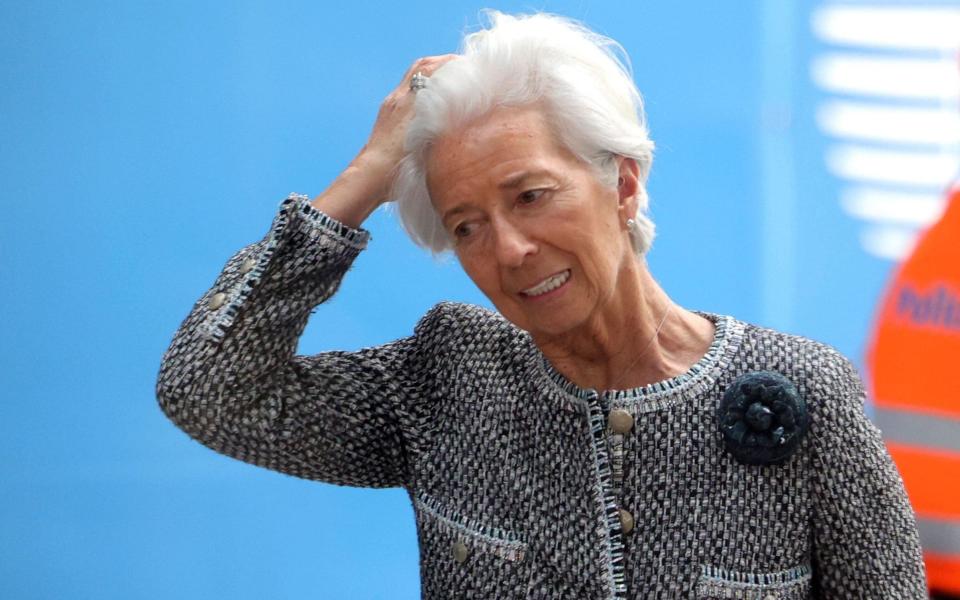Europe is in denial about the banking crisis engulfing it

“We’ve been assured there really isn’t a problem in the eurozone banking system”, the finance minister of one member state told me last week in the wake of the Credit Suisse collapse. “I’m not worried by current developments”.
Lessons had been learned from the crisis of 2009-12, I was told, with regulation, oversight and management immeasurably improved down to the smallest bank.
Olaf Scholz, the German Chancellor, was similarly reassuring. There was no reason to be concerned, he insisted.
There’s only one problem: the markets don’t seem to believe it.
Germany’s largest bank, Deutsche Bank, was the centre of a renewed rout in financial stocks on Friday as fears over the health of the eurozone financial system once again took hold. It won’t take much to trigger another full blown panic.
All three major Western central banks – the US Federal Reserve, the European Central Bank and the Bank of England – have nevertheless continued to tighten policy regardless, as if almost daring the financial system to keel over.
Resurgent inflation, not financial instability, is the main problem, they all parrot in unison, confirming the old truism that central banks are forever doomed to look backwards at the last mishap, rather than forward to the next one.
It is admittedly the case that Credit Suisse and Silicon Valley Investment Bank were special cases, where internal controls were sadly lacking. Both of them were also essentially bankers to the rich; this made them particularly vulnerable to a run.
Belief that the wider European banking system is in some way immune to any such affliction is nevertheless naive. It doesn’t matter how much capital and liquidity a bank may have – it’s finished if depositors lose faith.
Central bank complacency seems to have been particularly bad at the ECB, which while seeking to extend its influence into unmandated fields such as climate change, took its eye off the ball and seems to have wholly missed the escalating risks to both inflation and financial stability.
After its near-death experience in the eurozone debt crisis a decade ago, the European banking system is no doubt stronger and more resilient than it was. But not so much the underlying health of the national economies on which the system rests. This continues to look as worrying as ever.
While America and China are on a tear, Europe by contrast still languishes in post-Covid torpor, made worse by its lack of energy self-sufficiency and legacy of heavy reliance on cheap Russian gas.
By the way, I don’t exclude Britain from this sweeping generalisation. Far from it. With deep structural issues all of its own, the UK managed to take a bigger economic hit from the pandemic than almost anywhere else. The costs were off the scale. The subsequent inflationary problem and impact on living standards has also been significantly worse in Britain than elsewhere.
Be that as it may, it’s Continental Europe that is again fast becoming the focus of concern. Attempts to force through a minor increase in the pension age in France has prompted a state of anarchy so bad that it has prompted the cancellation of King Charles’s state visit. What hope for serious reform in a country whose lavish system of entitlements is a growing threat to national solvency itself?
Little noticed in Britain’s own shame over spiralling levels of government indebtedness, France’s debt to GDP rose to a staggering 113.4pc last year, far worse than the UK. The numbers are more alarming still in Greece, Italy, Portugal and Spain, and not much better in Belgium.
It’s true that Europe’s banking system is today better placed to withstand the “doom loop” of cross infection that threatened to destroy the euro back in the sovereign debt crisis of 2009-12. But nor has the threat entirely gone away; rising interest rates have substantially reduced the market value of banks’ holdings of government bonds, rendering all banks, big and small, far less solvent than they were.
We’ve not yet seen countries unable to repay or refinance their government debt, as happened last time. There is also the backstop of the ECB and the eurozone’s various other bailout mechanisms to help distressed banks this time around.
All the same, it’s easy to see why depositors should be spooked. Just to add to this tale of woe, Germany’s economic model seems to be breaking down before our very eyes. Its two great strengths – cheap energy from Russia to feed an industrial powerhouse substantially centred on internal combustion engine technology – are both spent forces.
The cheap energy has already gone, and the internal combustion engine is about to be made obsolete. Trapped in the past, and despite belated attempts to catch up, Germany badly trails the US and China on re-engineering its auto industry to electric vehicles.

Europe’s half-hearted package of incentives and subsidies for galvanising the wider green transition is meanwhile proving no match for America’s “Inflation Reduction Act”, which is hoovering up all the best tech and expertise.
I cannot tell you where today’s rolling series of banking crises will end. Don’t believe anyone who tells you they can. But what’s clear is that the main culprits are again our old friends, the central banks.
They knew even at the time they embarked on ultra easy monetary policies in response to the economic dislocations of the last banking meltdown that there would be a high risk of further financial stability the moment they tried to reverse it.
Perhaps that’s why they were so slow to act when inflation came roaring back, dismissively characterising it as “transitory”, rather than structural as it has now turned out to be.
Belatedly recognising the danger, they slammed on the brakes with a tightening of unprecedented speed and quantity. Having acted too slowly, they then acted too abruptly, giving the system no time to adjust to the new world order.
In addressing their primary mandate – controlling inflation – central banks have undermined their equally important purpose of preserving financial stability, which until the events of the past few weeks has been little more than an afterthought.
In any case, the turmoil is by no means over. The eye of the storm has moved from London’s Liability Driven Investment debacle, via America’s Silicon Valley Bank, and now back to Europe again, first engulfing Zurich’s Credit Suisse and now threatening even Frankfurt’s Deutsche Bank.
There is no reason to worry about our largest bank, Germany’s Scholz insists, as indeed he must, regardless of whether he believes it or not. To say anything else would only fuel the panic.
Even so, it sounds worryingly like the football club chairman who expresses complete confidence in his erring manager; this acts only as confirmation that the manager is about to get the bullet. We must hope Scholz is right about Deutsche. But in the meantime, Europe’s woes keep compounding.




